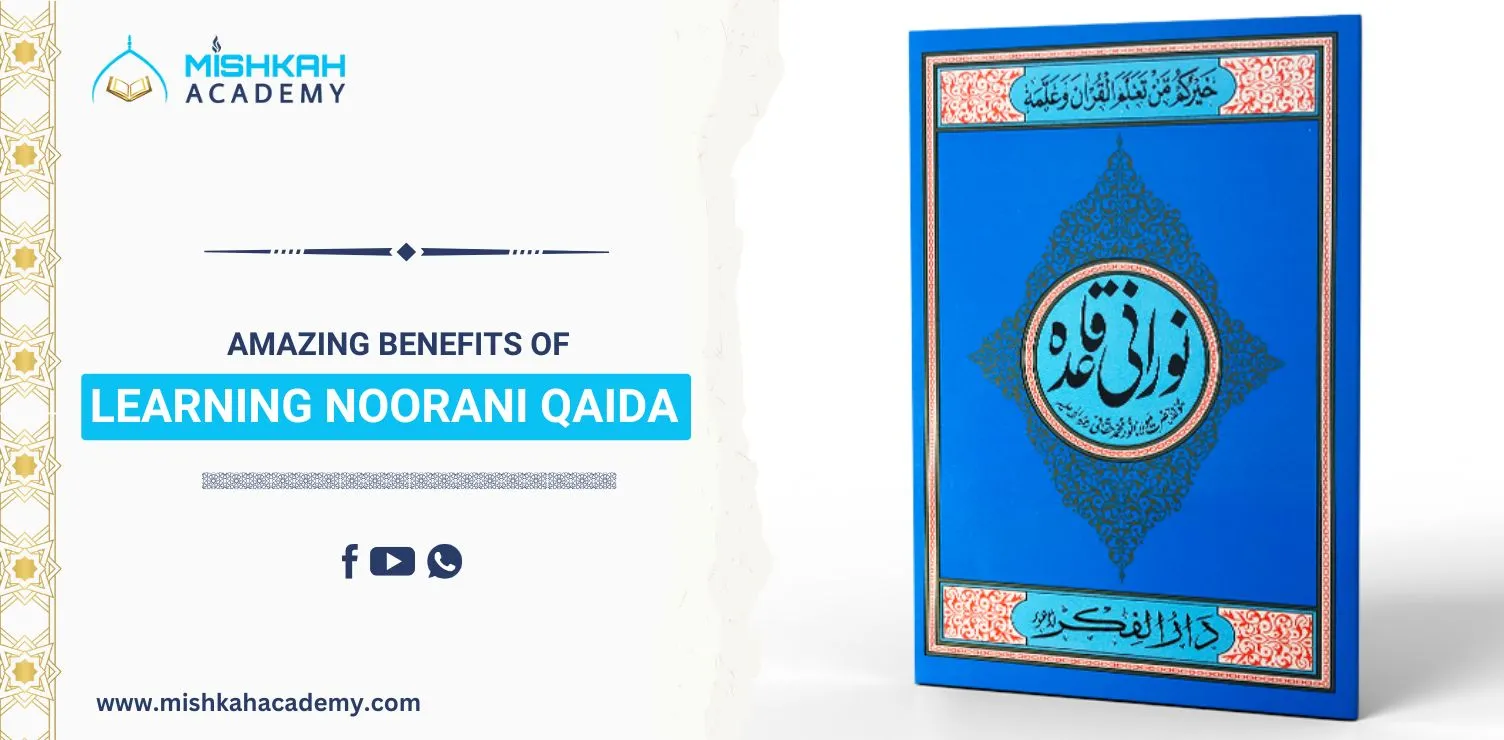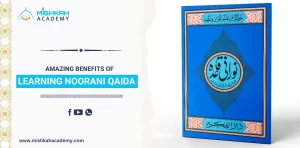Noorani Qaida starts by introducing the twenty-eight (28) letters of the Arabic alphabet. It then progresses to lessons on recognizing Arabic vowel sounds, practicing their pronunciation, and learning how to combine letters to form words. These step-by-step exercises make it an essential guide for mastering the basics of Quranic Arabic.
The benefits of Noorani Qaida are vast. Firstly, it enables learners to recognize and memorize Arabic letters effectively. Secondly, it establishes a strong foundation in spelling and pronunciation, which is vital for Quranic recitation. Additionally, students are introduced to essential Arabic terms and basic Tajweed rules, which become invaluable as they advance to reading and understanding the Quran.
8 Amazing Benefits of Noorani Qaida
Table of Contents
ToggleHere are some advantages of noorani qaida shared by Mishkah Academy Quran tutors.
1. Building a Strong Foundation in Arabic Spelling
A strong understanding of Arabic spelling is very important for anyone who wants to read and recite the Quran correctly. Noorani Qaida is a great book for beginners, as it helps students learn the Arabic alphabet step by step. The book doesn’t just teach how to recognize letters but also shows how each letter changes its shape depending on where it is in a word—whether at the beginning, middle, or end of the word. This is important for reading and pronouncing Arabic words correctly.
For example, the letter Alif looks different when it stands alone than when it is joined with other letters. The letter Hamza is special because it can appear in different ways, depending on where it is in a word. Hamza can be placed on top of Alif (called Alif Hamza) or on top of Ya (called Ya Hamza), and sometimes it appears below Alif. Learning how Hamza and other letters change their shapes helps students understand how to read Arabic words properly.
This knowledge is not only helpful for reading the Quran but also for reading other Arabic books, like stories and newspapers. By learning these basic spelling rules, Noorani Qaida course helps students get better at recognizing and writing Arabic letters. This is the first important step to becoming fluent in both reading the Quran and understanding Arabic.
2. Enhances Quranic Tajweed
The structured approach of Noorani Qaida plays a significant role in making Tajweed easier to understand and apply. The book starts by introducing the Arabic alphabet, focusing on the proper pronunciation of each letter. This solid foundation is key for anyone aiming to read the Quran correctly, as each letter has its own distinct sound that must be pronounced accurately.
As students progress through the book, they are gradually introduced to more advanced concepts, such as Madd (elongation), which teaches how to stretch certain vowels in specific ways. Sifat, the characteristics of letters, is also explained in detail, helping learners understand the unique qualities of each letter that affect its pronunciation.
In addition, Noorani Qaida covers important rules like Waqf (stopping), and the rules related to the letters Noon Sakinah and Meem Sakinah. These rules include Izhar, Idgham, Iqlaab, and Ikhfaa, which help learners understand how to deal with specific letter combinations when reading the Quran.
By gradually building on the foundational knowledge of these Tajweed rules, Noorani Qaida prepares students to recite the Quran in the way it was revealed to the Prophet Muhammad, ensuring both correct pronunciation and proper rhythm. This step-by-step progression is essential for developing a deeper understanding and mastery of Tajweed, making it easier for learners to read the Quran beautifully and correctly.
3. Introducing Quranic Vocabulary Early
Many beginner books delay introducing Quranic words, assuming that beginners don’t need them right away. However, Noorani Qaida takes a different approach. The author believes that exposing learners to Quranic words early on is important. Most of the words used to teach spelling and pronunciation in Noorani Qaida are directly taken from the Quran. This intentional inclusion helps familiarize beginners with the words of the Quran from the very start.
As learners progress through Noorani Qaida, they will notice that many of the words they have learned are found in the Quran. This early exposure helps students become more comfortable with Quranic vocabulary, enabling them to recognize and understand these words when they begin reading the Quran itself. It also accelerates their learning process, as they are already familiar with a large portion of the language and vocabulary, making it easier to learn and recite the Quran in a shorter time.
4. Enhances Arabic Writing Skills
Studying Noorani Qaida not only improves your ability to pronounce Arabic correctly but also plays a significant role in enhancing your Arabic writing skills. By learning the Arabic alphabet and understanding its various forms, you’ll become familiar with how letters change depending on their position within words. This is an essential skill for anyone looking to write Arabic accurately.
Noorani Qaida offers practical exercises where you can practice writing words and sentences, allowing you to apply what you’ve learned about letter formation and its connections. These exercises provide hands-on experience in writing, helping you understand how letters join together to form words. As you continue practicing these writing exercises, you’ll gain confidence in your ability to express ideas and communicate effectively in written Arabic. Over time, with consistent practice, you’ll notice steady progress in your writing, making it easier to use Arabic in everyday situations.
Note: Enrolling in an online quran recitation course with native arab tutors can help to recite and understand quran properly.
Start Your Noorani Qaida Learning Now5. Enhances Quranic Recitation
Mastering Noorani Qaida is essential for anyone looking to recite the Quran beautifully and accurately, with proper Tajweed and pronunciation. The book lays a solid foundation, equipping learners with the necessary skills to approach Quranic recitation with confidence, reverence, and precision.
By studying Noorani Qaida, you’ll be able to improve your quran recitation, making it more melodious and clear. The knowledge gained will boost your confidence in pronouncing Arabic words correctly, ensuring you avoid mistakes that could alter the meaning of the Quranic verses. Whether you’re just starting or seeking to refine your skills, Noorani Qaida offers the guidance you need to recite the Quran as it was intended to be recited.
6. Mastering Short Vowels (Harakaat)
Once the student becomes familiar with the basic Arabic letters, the next crucial step is learning the short vowels—Fatha, Damma, and Kasra. These vowels play a vital role in determining the sound of a letter in different contexts. Noorani Qaida introduces these three essential vowels, which are placed above or below the Arabic letters. By mastering these, students can begin to form simple syllables and words, marking the beginning of their journey toward understanding how letters interact with vowels to produce sound.
7. Combining Letters and Vowels
After students have learned the individual letters and vowels, Noorani Qaida moves on to the combination of these elements. By joining consonants with vowels, students begin forming syllables. This stage is essential as it helps learners recognize how words are structured in the Arabic language. With consistent practice, students gradually develop the skill to read simple words, a key foundation for reading the Quran correctly.
8. Introduction to Long Vowels
The next stage in Noorani Qaida involves the introduction of long vowels—Alif, Waw, and Ya. These vowels are used to elongate the sounds of certain letters, which is an important aspect of correct Quranic recitation. Understanding how long vowels change the pronunciation of words is crucial for proper Tajweed, especially when it comes to elongating specific sounds during recitation. This knowledge helps students achieve accurate and melodious pronunciation, which is necessary for proper Quranic reading.
Conclusion
Noorani Qaida is an excellent tool for building a strong foundation in Arabic phonetics and writing. Its interactive lessons, quizzes, and exercises give learners plenty of chances to practice, helping to improve their pronunciation, writing, and Quran recitation skills. In addition, it boosts confidence, enabling students to communicate better in Arabic and approach Quran recitation with accuracy and respect.
Whether you’re starting from scratch or looking to refine your skills, Noorani Qaida offers undeniable benefits. It’s a valuable resource for anyone dedicated to mastering both the Arabic language and the proper recitation of the Quran.
Join us at Mishkah Academy, and together, we’ll make your quran journey a fulfilling and spiritually uplifting experience for students from the UK, USA, Canada, Australia, Germany, and across Europe.
Start Your Noorani Qaida Learning Now





